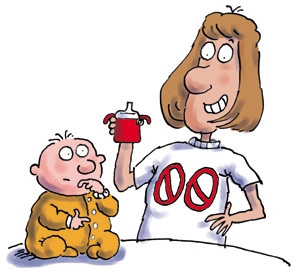
Cup Transition For most children, the recommendation to transition from the bottle to Keep Reading >>
Dedicated to up to date pediatric feeding and dysphagia information

Hi, I'm Krisi Brackett, PhD, CCC-SLP,C/NDT. This blog is dedicated to current information on pediatric feeding and swallowing issues. Email me at feedingnewsletter@gmail.com with questions.
Read More About Me Here...

Cup Transition For most children, the recommendation to transition from the bottle to Keep Reading >>
I want to thank Dr. Piazza for giving permission to repost this article.It was originally printed in Paradigm Magazine, • Fall 2000, pg. 8-9. It's one of my favorites. Krisi “Don’t worry, Keep Reading >>
http://www.kellydorfman.com/home.html Posted on April 8, 2013 – Huffington Post "It is really weird," Colin's mother reported. "He will like and eat something for weeks and then suddenly Keep Reading >>


Question: I am developing an outpatient feeding clinic to become more interdisciplinary. When you do a feeding evaluation on a child for the first time, what professionals are usually involved? I Keep Reading >>
http://www.flavourjournal.com/ Flavour is a peer-reviewed, open access, online journal that publishes interdisciplinary articles on flavour, its generation and perception, and its influence on Keep Reading >>


Parents often ask – “what is the best nipple to use for bottle-feeding my baby?” For most healthy, full-term babies, it really might not matter. Most of these babies will be able to manage the Keep Reading >>
Please check out the blog I wrote for ASHA (The American Speech and Hearing Association)! http://blog.asha.org/2014/06/03/what-slps-need-to-know-about-the-medical-side-of-pediatric-feeding/ Keep Reading >>
Case Study: Long Meal Times and Poor Chewing: A feeding Team Approach Referral:B.T. - a 6 year old female with prolonged meal time (meals can take 45-60 minutes). B.T. also pockets and holds solids Keep Reading >>